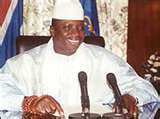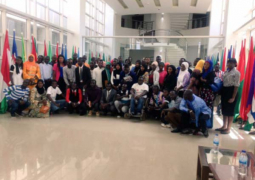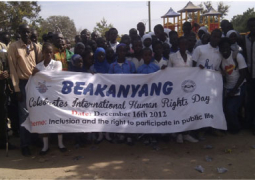
Politicians Assess Jammeh's Administration
On the eve of the celebrations of the July 22nd military take-over, which clocks exactly 14 years tomorrow Tuesday, The Point's political correspondents went out and about to elicit the opinion of notable functionaries from all political parties with regard to their assessment of the 14 years of President Yahya Jammeh's regime.
July 22nd, as the day has come to be called, was that fateful day in 1994 when some military officers led by the then Lieutenant Yahya A.J.J. Jammeh toppled the Progressive People's Party (PPP) government of Sir Dawda Kairaba Jawara in a bloodless military coup.
Under the theme "
First to speak to the reporters was the Speaker of the National Assembly, Fatoumata Jahumpa-Ceesay, a staunch supporter of President Jammeh and the APRC party. Other speakers included Mr. Halifa Sallah of PDOIS, Lawyer Ousainou Darboe, UDP leader; Lamin Waa Juwara and Mr Henry Gomez, GPDP leader.
What follows are the views of these people on a number of issues concerning the day:
Fatoumata Jahumpa-Ceesay, Speaker National Assembly
I would first of all want to congratulate the President for yet another successful celebration in commemoration of the peaceful July 22nd military take-over and of course all patriotic Gambians who forms part of the majority.
I will not be gender biased but there is no doubt that you cannot talk about the success stories and achievements of President Jammeh without mentioning the women because he has really empowered us, emancipated us, given us our independence, respect and dignity so that we are known and seen every where in the world.
Yes it is a very significant day in the political history of this country, just as the theme of the celebration "
Taking a closer look at the three main sectors that President Jammeh has been talking about, even though we have many other sectors that registered tremendous achievements, the country have achieved a lot within 14 years.
On health, the number of hospitals in this country today are all state-o-the-art hospitals. We have a good number of health centres even in the remote villages that have been upgraded. The free accessibility of drugs in hospitals and health centres are all success stories.
If you look at the education sector, thanks to Yahya Jammeh, Gambians can now acquire university education in their own home soil. For the first time in the history of this country, we have a medical school which sceptics were saying it would not work, but it has worked. We also have the faculty of law, which will serve as a major boost to the Gambian judiciary.
On agriculture, we can all remember that when Jammeh came in 1994, he said back to the land, which I believe if all Gambians have listened to very seriously, then we will not be feeling any pinch or talking about the global food crisis. Looking at the vast land we have in this country, we can produce rice, feed ourselves and even sell. Jammeh has brought tractors to the farmers of this country. There is also accessibility of fertilisers which is also another success story.
Infrastructure development, Information Technology, economic growth are all great achievements of the Jammeh administration and I think what needs to be done is for those so-called politicians and intellectuals to sensitise the people of this country on the realities of what is happening especially based on world economy. These are some of the issues that the failed opposition politicians in this country should be telling the people. There is no real opposition in this country, they are all so-called failed politicians who always shout when elections come so that they can get money from outside for their selfish interests, thinking that Gambians are not wise.
Let them use the five years that they are sitting down if they are genuine oppositions to sensitise Gambians on the realities of the world today rather than trying to mislead them.
Halifa Sallah, Spokesperson Opposition NADD
First of all, we must ask ourselves the question "Why the anniversary?" Since I became conscious of what independence meant, I realise that it could not be more than the assertion of the sovereignty of the people and throughout my adulthood, I have been promoting that view. I believe that if I can achieve that objective alone in ensuring that each Gambian recognises that he or she is a sovereign person from whose will the authority of this government is derived, then there is no need for me to continue to try to be even any body's representative.
Well I was a member of the opposition and opposed the former regime by using every language to describe it as incompetent in promoting the prosperity and liberty of the people. But at the same time, if any action is taken to overthrow that government and institute a council which was not elected to impose its will on the people, to abrogate a constitution and the rights of the people to a point that it appears that few citizens control and own the country, then to commemorate that day is to me the assertion of what we must emphasise as an authoritarian rule.
I think what we should be commemorating is April 24th, a day when
Fourteen years after this government came into office, there is deficit to liberty and sovereignty. Just few days ago, we were told that two judges have been removed. Where is the security of tenure if judges can be removed? And under normal circumstances, the judiciary is able to protect itself and have the objective of protecting the independence and impartiality of that institution.
Moving on to poverty in this country, there is no doubt that poverty has increased rather than decreasing. Looking at the situation of the country, you should expect growth in agriculture after fourteen years but government cannot still purchase the produce of the farmers.
Why was it not possible before you put over D400 million on a hotel (Ocean Bay), with all the guarantees that the Social Security can provide, to establish a co-operative credit union by the farmers so that they can go and purchase the groundnuts and then look for external markets for the produce? Why has it not been possible to do this for fourteen years? And you still continue to say "back to the land." Over 70% of the people are already on the land and I believe this "back to the land" slogan is just a mystification of the situation. The reality is that people are already on the land and the only way to retain them on the land is to offer them the condition that is required. Therefore, the agricultural policy of the government for the past fourteen years has been ineffective and efficient.
Looking at the employment situation in the country, you have over 185, 000 students in our Primary Schools, 67, 000 students in our Upper Basic Schools and 27, 000 students in our High Schools. They are coming out and within a period of ten years, all of them will be in the streets. You have not provided them with a proper agricultural system that can earn them the means through which they can survive. If you say the young people of this country do not want to work, I believe the best thing you should do is to show them what they should do.
Lawyer Ousainou Darboe, Opposition UDP leader
You must remember July 22. You have to put it in a proper perspective. It was an event that ushered in a military dictatorship, a dictatorship that willed its wishes on the Gambian people for two years. And very reluctantly set off its military attire and put on civilian attire and classified itself as a civilian regime. It has of course not disrobed itself of its military attributes. What used to happen during the transition is what is still on in the country. It is against this background that one has to look at the July 22 celebrations, whether it is worth celebrating.
We have seen few days ago two judges sacked without following constitutional provisions. These are the things that I am saying that the military attributes of the regime are still there. In fact, celebrating July 22 is a demonstration of only its military attributes that they still consider themselves as military, so therefore celebrate a military take-over.
In my view, any government that calls itself a democratically elected government; any government that believes in the rule of law and a government that believes that governments should be changed through the ballot box, has no business in celebrating a military take-over. It is wrong for them to do so and they should stop it.
They are spending enormous resources in celebrating an illegality. People are being kept away from work on 22nd July just to celebrate an illegality. In fact, it is sending wrong signals to anti-democratic elements within the society, who would believe that a take-over of government by unlawful means is a right thing to do. So I do not think it is right for the Jammeh administration, that prides itself in being a democratically elected government, to celebrate an illegality; to celebrate the usurpation of constitutional authority by unlawful means is wrong.
Lamin Waa Juwara, NDAM leader
There are huge achievements that this very change brought and the fact that that very change has restored democracy. So I don't see any reason why it should not be celebrated.
I think that any honest assessment, a revolutionary character, of the July 22 has been manifested amply. Many people were sceptics, including myself, because of the experiences that we had in military take-overs and the havoc it has created in many other countries. Our concern for our country, with apprehension that we had, made us initially to think that things were going to go wrong. But today, any honest assessment should come to the conclusion that it is a revolution. And when they said they are going to be a government with a difference and are going to deliver transparently with accountability. and I think this is achieved.
Obviously one can see development in many areas. It is comprehensive; it is not in one area. And I think as an honest politician, with all the experience we have had since July 22, I think our standing today should be completely different from what used to happen. There will be no point in trying to do politics the old way, the confrontational type of politics that has wrecked havoc in many African countries. It has no place now in this country.
First, we had a democratic election, which was free and fair, which nobody can turn and say it wasn't an election reflecting the wishes of the Gambian people. And once that have been achieved, I think that the attitude of all genuine politicians, whose common interest is to see that there is that politics of co-operation.
Governments are accountable to themselves and they should be held accountable by the opposition. But the primary objective is that both the government and the opposition should have the paramount interest of the country, and there they become opponents and not enemies.
I think we should put our politics higher so that we understand what pluralism means; what democracy is all about and how we should engage each other, even if you are in government and the other in the opposition. And this is needed more in The Gambia, where we are a small country with a small family.
I think the more we sit idly and just criticise without making our own contribution, the more we become discredited.
There are times when policies can go wrong, and when it goes wrong, it is the players that should come to accept that their interests are secondary and the primary interest of the country is what is paramount.
In the
Henry Gomez, Opposition Leader GPDP
I would first of all like to congratulate the president and the APRC party. One thing about the 22nd July is that as Gambians, we should understand that whatever God destines, there is nobody on earth who can go against it.
God is the one that chose President Jammeh to rule this country and we all know that taking a country at the age of 29 is a very difficult task. Whether he got the country through coup d'etat or not, we have to accept him as our President despite being oppositions.
Thirty years of PPP regime cannot be in any way compared to fourteen years of Jammeh's regime because the man has really done a lot and we have to accept that in good faith.
Yes, people are crying all over the country that prices of commodities are expensive but I believe the blame should not go on President Jammeh or his government. The blame should rather go on the World Bank.
One thing that is fundamental is that the country has to be decentralised if President Jammeh wants more progress in this country. We have to decentralise this country and allow each and every Gambian to play his part towards the development of this country.
President Jammeh cannot sit at State House and know what is going on in Basse or elsewhere because the authorities there will only tell him what he wants to hear.
The ruling body is calling on Gambians to go back to the land but President Jammeh should understand that we are not all meant to go to the farm.
You cannot tell people to go back to the land when farmers don't have enough tractors or fertilisers to farm. We are only saying back to the land because it is nice on our tongue.
One thing I would like to tell President Jammeh is that he should accept the opposition. We are not enemies, but we are all in for one purpose and that is to take our country to the best level. Jammeh should try to work with the opposition hand in hand and give functions to them. This can, in many ways, bring rapid progress to this country.
The opposition should also accept that President Jammeh is the leader of this country. He is not as bad as the way people think he is. He also loves this country as we all do. We have to accept him as our President. We have to give him a lending hand but only if he takes it. This is the only way forward for this country.
Read Other Articles In Article (Archive)
Mustapha Sidebeh Wins Njawara Marathon
Jul 29, 2008, 12:21 PM



